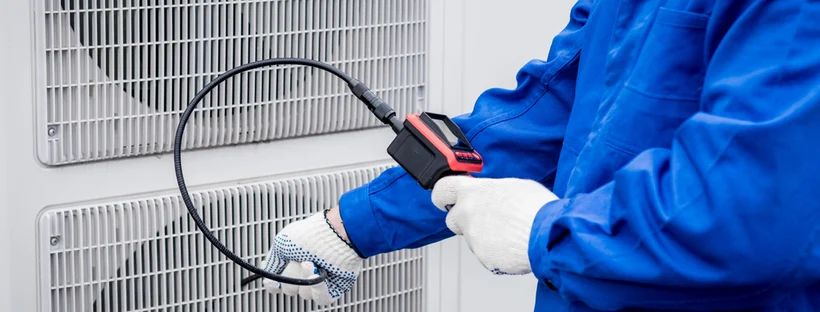The HVAC system takes center stage when considering investments in your home’s comfort and energy efficiency. In recent years, a seismic shift within the HVAC industry has steered away from using R22 refrigerant due to its adverse environmental impact. This article explores the significance of R22 awareness in the context of long-term HVAC investments, shedding light on how the Raiven platform can aid in navigating this transformative period.
The Importance Of Your HVAC System
Your HVAC system is more than a luxury; it’s an indispensable component of your home or commercial property. It ensures year-round comfort, maintains healthy indoor air quality, and significantly influences long-term financial planning through its impact on energy bills.
What Is R22 Refrigerant?
R22, commonly known as Freon, is a hydrochlorofluorocarbon (HCFC) refrigerant that has been a staple in HVAC systems for decades. Despite its role in cooling and dehumidifying indoor spaces, R22 has come under scrutiny due to its adverse environmental effects.
The Environmental Impact Of R22
R22 has been identified as a contributor to ozone layer depletion, prompting international agreements like the Montreal Protocol to phase out substances with harmful environmental impacts. As a result, the production and importation of R22 have been significantly curtailed, leading to increased costs and limited availability.
R22 Phase-Out Timeline
Since the late 1980s, the Montreal Protocol has gradually eliminated R22. The Environmental Protection Agency in the United States has enforced restrictions to reduce the production and usage of R22, resulting in scarcity and elevated costs.
The Impact On Existing HVAC Systems
If your HVAC system predates the recent shift from R22, it likely relies on this refrigerant. As R22 becomes scarcer and more expensive, servicing and maintaining these older systems can become financially burdensome.
Considering the current year is 2023, HVAC systems manufactured before this time may still be using R22, making it crucial for homeowners and businesses to assess their systems and plan accordingly for the transition to alternative refrigerants.
Alternatives To R22
Fortunately, alternative refrigerants like R410A and R32 are available. These alternatives are more environmentally friendly and comply with current regulations, and upgrading them can ensure long-term comfort and environmental responsibility. You can also check other alternatives on Raiven’s platform, which offers a wide range of top HVAC supplies at great discounts.
Benefits Of Transitioning To Alternative Refrigerants
Switching to alternative refrigerants offers several benefits, including environmental friendliness, increased energy efficiency, and extended HVAC system longevity, thereby minimizing maintenance costs.
Financial Considerations
While the initial investment in a newer HVAC system may be required, the long-term savings in decreased energy usage and maintenance costs often outweigh the upfront expenditures.
Planning For The Future
Proactively addressing the phase-out of R22 by consulting with HVAC professionals ensures that you can avoid unexpected expenses and secure your comfort and sustainability for years to come.
Environmental Regulations And Compliance
Understanding the regulations governing refrigerants is crucial. Comprehend the specific environmental rules related to R22 and how compliance impacts HVAC system owners to prevent legal troubles and environmental impact.
Retrofitting Vs. Replacement
Discuss the two options available to HVAC system owners facing the phase-out of R22: retrofitting existing systems or replacing them with newer, eco-friendly models. Investigate the benefits and drawbacks of each strategy, such as economic concerns, energy efficiency, and the influence on long-term HVAC investments.
Energy Efficiency And Savings
Let’s delve into the pivotal role of refrigerants in the energy efficiency of HVAC systems. You can unlock potential energy savings over time by transitioning to alternative refrigerants like R410A and R32. For instance, these environmentally friendly alternatives contribute to reduced energy consumption and offer real-world examples and data showcasing the associated cost reductions. Upgrading to eco-friendly refrigerants is a smart, long-term investment for both your wallet and the environment.
HVAC System Maintenance And Lifespan
Now, let’s examine the impact of the R22 phase-out on the maintenance and lifespan of HVAC systems. As the availability of R22 diminishes, servicing and maintaining older systems reliant on this refrigerant become more expensive. Frequent service is essential to extend the life of these aging systems. However, transitioning to alternative refrigerants can alleviate these concerns, potentially extending the longevity of your HVAC equipment. Consideration of such factors is crucial when planning for the future of your HVAC system.
Professional Guidance And Consultation
Emphasize the value of seeking guidance from HVAC professionals. Discuss the advantages of engaging with specialists who can analyze your individual situation, offer appropriate solutions, and guide long-term HVAC investments. Encourage readers to engage with qualified professionals to make informed decisions.
Government Incentives And Rebates
Explore any government incentives, rebates, or tax credits to encourage the transition to eco-friendly HVAC systems. Explain how taking advantage of these incentives can offset the initial costs of upgrading, making it even more financially appealing for homeowners and businesses.
Conclusion
In conclusion, R22 awareness is vital for anyone investing in their HVAC system for the long term. Understanding the environmental impact of R22 and its phase-out timeline can help you make informed decisions about your HVAC equipment. Transitioning to alternative refrigerants not only benefits the environment but also offers financial advantages and ensures the reliability of your system. By planning for the future of your HVAC system today, you can enjoy comfort, cost savings, and peace of mind in the years ahead.

